Catena is now Pearl Talent! Same mission, new name.
Email Contact Manager vs CRM: A+ Guide to Key Differences
Email contact managers and CRMs are vital tools for businesses seeking to organize and streamline their communication with clients and customers. They offer a centralized platform to store contact information, track interactions, and streamline workflows. Utilizing these tools improves customer relationships and increases productivity across the organization.
Pearl, a trusted overseas operations placement service, provides a pool of skilled virtual assistants adept at handling email communication and utilizing CRM software effectively. Our team is committed to managing customer interactions, ensuring prompt responses, personalized communication, and streamlined follow-ups. This capability enhances our service delivery, elevating customer experience and fostering long-term client success.
Tapping into our expertise, we’ve created this guide to help businesses distinguish the differences between email contact managers and CRMs. We will explore how these tools can streamline communication and enhance customer relationships by outlining their distinct features and functionalities. In the end, you'll have a clear understanding of their differences, enabling you to make informed decisions for your business needs.
Let’s get started!
Email Contact Manager vs CRM: What’s the Difference?
Email contact managers and CRMs are essential for managing customer interactions but serve different purposes. An email contact manager focuses on organizing and managing email contacts and communications. On the other hand, a CRM system goes beyond email to track and analyze customer interactions across various channels.
What is an Email Contact Manager?

An email contact manager is a software tool designed to help businesses organize their email contacts. It serves as a digital address book where users can store contact details such as names, email addresses, phone numbers, and additional information. Its primary function is to provide easy access to contact information, streamline communication, and facilitate effective relationship management.
A mail contact management system offers features like contact categorization, search and filter options, and the ability to add notes or tags to contacts for better organization. They are particularly useful for professionals who deal with a large volume of email contacts and need a centralized system to manage them effectively.
When to Use an Email Contact Manager
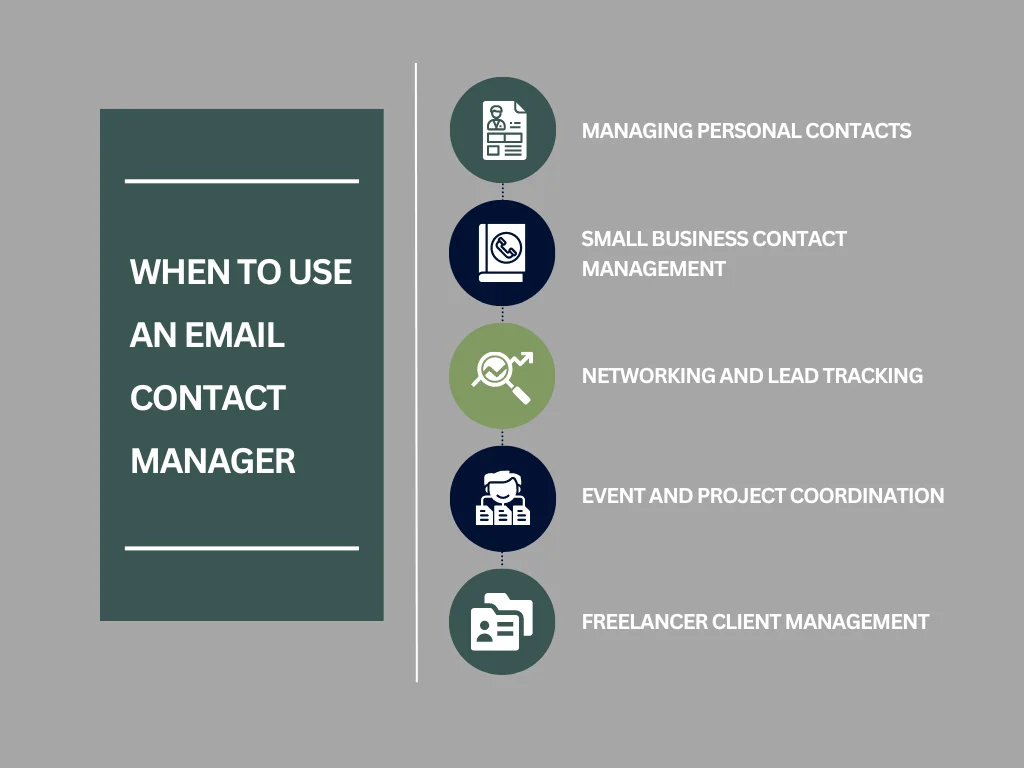
- Organizing Personal Contacts: An email contact management tool is excellent for individuals who organize their personal contacts, including friends, family, and acquaintances, in one accessible place.
- Managing Small Business Contact: It's ideal for small businesses or freelancers to maintain a database of clients, suppliers, and collaborators to streamline communication and follow-ups.
- Networking and Lead Tracking: Professionals involved in networking or sales can use email contact management software to track leads, schedule follow-up emails, and maintain a record of interactions for better relationship management.
- Coordinating Event and Project: When coordinating events or managing projects, email contact managers can help keep track of participant lists, communication preferences, and important deadlines.
- Freelancer Client Management: Hiring a freelance virtual assistant can benefit from email managers to organize client information, track project progress, and schedule client communications effectively.
What is a CRM?
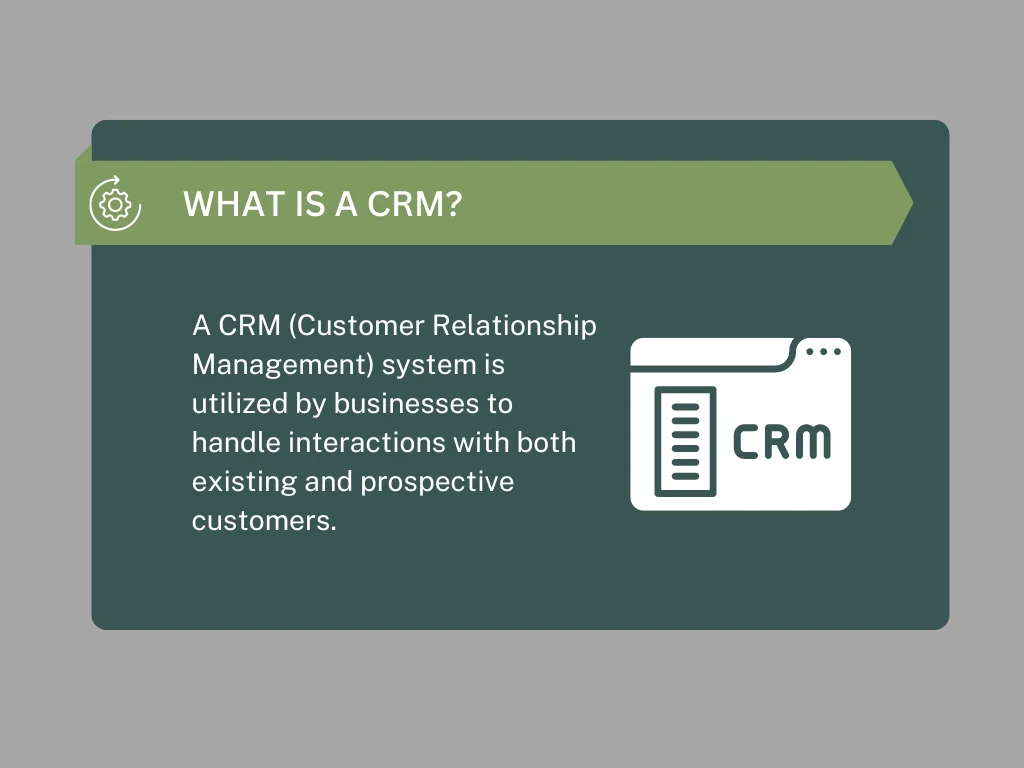
A CRM (Customer Relationship Management) is a system used by businesses to manage interactions with current and potential customers. It consolidates customer data from various touch points like sales, marketing, and customer service, providing a holistic view of each customer. Its main goal is to foster relationships that boost customer satisfaction and loyalty.
This allows businesses to personalize interactions, anticipate needs, and tailor their offerings based on customer preferences and behaviors. Companies that use CRM can streamline processes, improve communication, and ultimately drive sales growth.
When to Use a CRM Solution
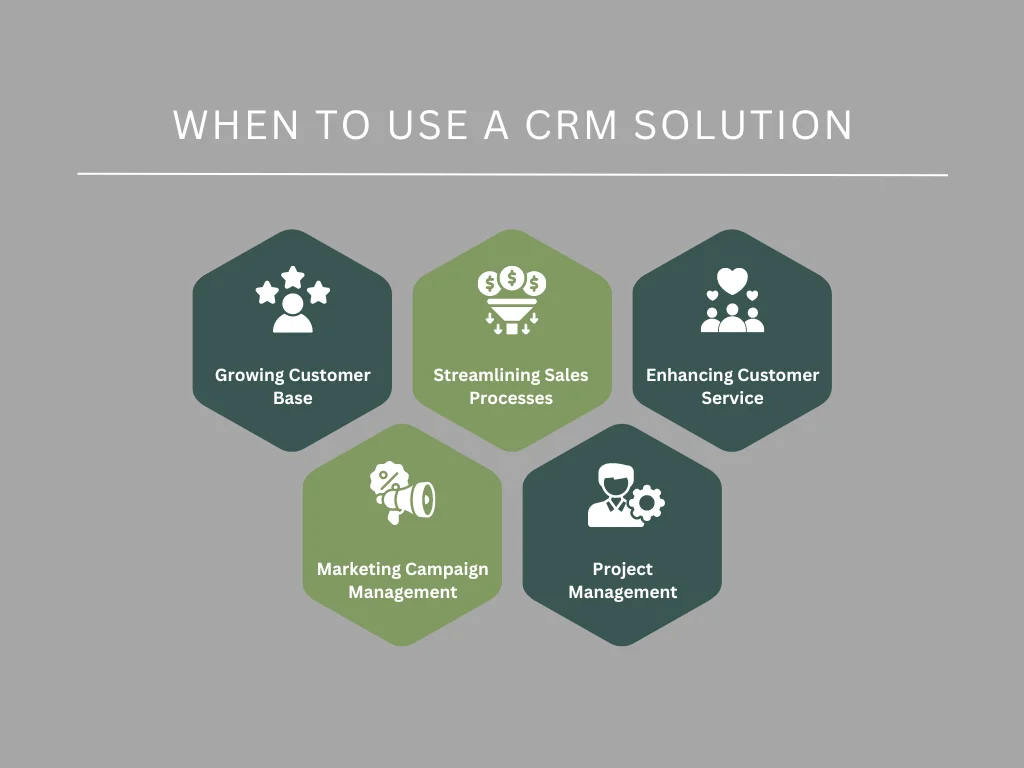
- Growing Customer Base: As your business grows and attracts more customers, managing customer interactions and data manually can be prone to errors. A CRM solution streamlines and centralizes the information, enabling you to handle a large and expanding customer base efficiently.
- Streamlining Sales Processes: Implementing a CRM is ideal for businesses looking to streamline their sales processes, from lead generation to closing deals. It centralizes sales data, automates tasks, and provides insights for better decision-making.
- Enhancing Customer Service: A CRM system is valuable for improving customer service by maintaining a comprehensive history of customer interactions. It enables quick issue resolution, personalized support, and proactive communication.
- Marketing Campaign Management: Using a CRM solution is advantageous for managing marketing campaigns effectively. It allows the segmentation of customer groups, tracks campaign performance, and facilitates targeted messaging to enhance marketing ROI.
- Project Management: A CRM system can also be used for project management, especially in industries involving extensive customer interactions. It helps track project timelines, communicate with stakeholders, and allocate resources for successful execution.
Core Differences Between Email Contact Manager and CRM
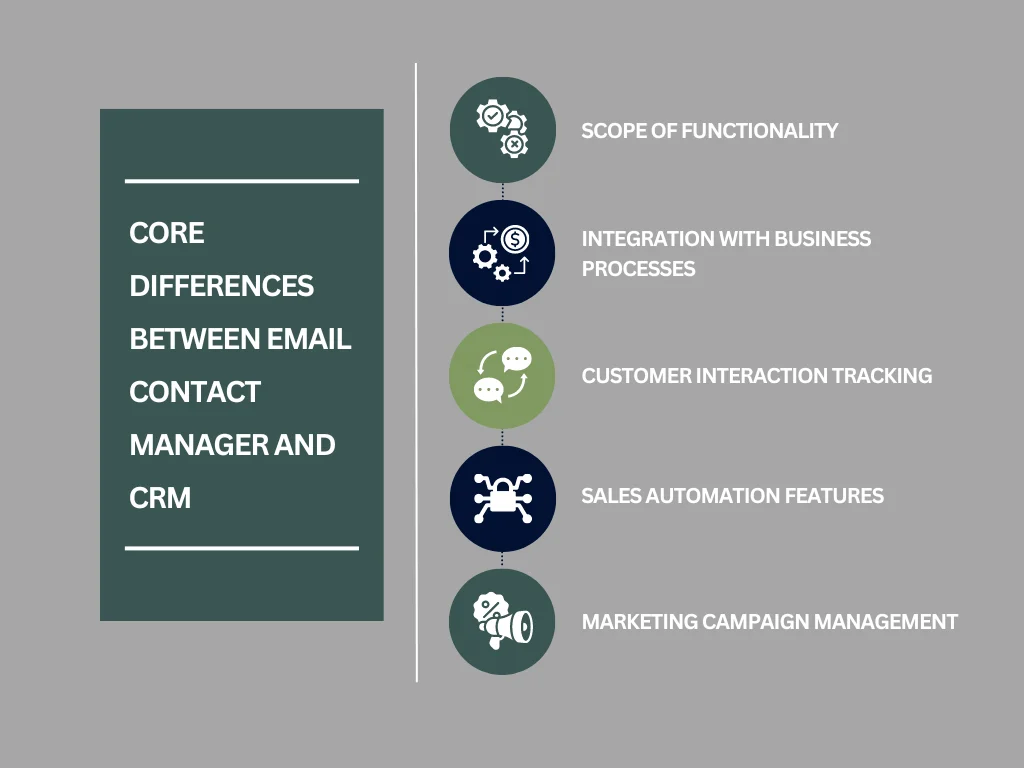
Understanding the core differences between an email contact manager and CRM software is essential for choosing the right solution for your needs. While both tools are designed to manage customer information, they serve distinct purposes and offer unique features. Here are the core differences between contact manager and CRM software:
Scope of Functionality
- Email contact managers focus primarily on managing contact info, emails, and basic communication tasks. They provide a straightforward interface for handling email correspondence and organizing contact details.
- In contrast, CRM systems offer various functionalities beyond contact management. They encompass sales automation tools, marketing campaign management, customer service features, analytics, and reporting capabilities.
Integration with Business Processes
- Email contact managers typically operate as standalone tools, serving as dedicated email and contact management platforms. While they excel in managing individual communication needs, they may need more seamless integration with other business processes.
- On the other hand, CRM systems are designed to integrate with multiple business processes and systems. They serve as central hubs for customer-related activities, enabling seamless data sharing across sales, marketing, and customer support departments.
Customer Interaction Tracking
- Email contact managers store and manage contact details, log sent and received emails, basic contact details, and even email click and open rates. This level of tracking provides insights into communication history but may not capture comprehensive customer interactions.
- CRM systems offer advanced customer interaction tracking capabilities. They record many customer interactions, including emails, calls, meetings, purchases, support tickets, social media engagements, and marketing interactions.
Sales Automation Features
- Email contact managers typically need advanced sales automation features commonly found in CRM systems. While they may offer basic email scheduling and reminders, they need to provide robust sales pipeline management, lead scoring, or sales forecasting functionalities.
- CRM systems have extensive sales marketing automation features to streamline the sales process. These CRM features include lead management, opportunity tracking, automated workflows, sales pipeline visualization, quote generation, and performance analytics.
Marketing Campaign Management
- Email managers primarily focus on individual email communications and may need built-in tools for managing email marketing campaigns. They need functionalities such as campaign creation, audience segmentation, email automation, A/B testing, and performance analytics.
- CRM systems integrate marketing campaign management tools alongside customer data, enabling businesses to create targeted email campaigns, track campaign performance, and analyze marketing ROI.
Customization and Scalability
- Email contact managers may offer limited customization options and scalability, making them suitable for basic contact management needs but less adaptable to evolving business requirements.
- CRM systems provide extensive customization capabilities, allowing businesses to tailor the CRM platform to their specific workflows, data fields, user roles, and reporting requirements.
Reporting and Analytics
- Email managers typically offer basic reporting on email statistics, contact activity, and sometimes basic performance metrics related to communication.
- CRM systems provide advanced reporting and analytics features that go beyond email metrics. They offer insights into sales performance, customer behavior and satisfaction, and overall business KPIs.
Benefits of an Email Contact Manager

Several email management tools offer numerous benefits for individuals and businesses looking to streamline their contact management and communication processes. These tools provide features that help enhance productivity and efficiency.
Efficient Contact Organization
An email contact manager helps organize contacts efficiently, making it easy to find and manage important contact information like names, emails, and phone numbers in one place. This organization reduces the time spent searching for contact details while ensuring accurate information when reaching out to customers or colleagues.
Users can quickly locate specific contacts or groups with features like categorization and search filters, streamlining communication and improving productivity.
Streamlined Communication
Having streamlined communication is crucial for efficient business transactions. An email contact manager provides quick access to contact details, enabling faster email responses and ensuring all messages get noticed in a cluttered inbox.
This helps users stay organized and respond promptly to inquiries or requests, improving overall communication efficiency. An email contact manager facilitates smooth and professional communication workflows with features like email templates and scheduling tools.
Improved Productivity
An email contact manager improves productivity by centralizing contact information and reducing the time spent tracking emails or contact details across different platforms. This saves users valuable time and allows them to focus on more critical tasks. Additionally, features like email templates and automation tools help streamline repetitive tasks, such as sending follow-up emails or scheduling appointments, further boosting efficiency.
Tailored Follow-ups
Effective follow-ups help maintain positive relationship management. An email contact manager facilitates setting reminders, scheduling follow-up emails, and tracking interactions, ensuring no important communication or opportunity is missed.
This feature helps users stay organized and maintain a consistent follow-up schedule, which is crucial for building relationships and closing deals. Tailoring follow-ups based on each contact's preferences or previous interactions allows users to provide relevant information and address specific needs.
Personalization and Customization
One of the key features of email contact managers is its ability to personalize and customize customer data, making it easier to tailor your communication with the contact list. This customization helps users organize contacts based on specific criteria, enabling targeted and relevant communication.
Business owners and team members can remember important details and engage in more meaningful conversations by adding personalized notes or tags to contacts. This level of personalization and customization enhances communication effectiveness, fosters trust, and improves customer relations.
Benefits of a CRM Software Solution
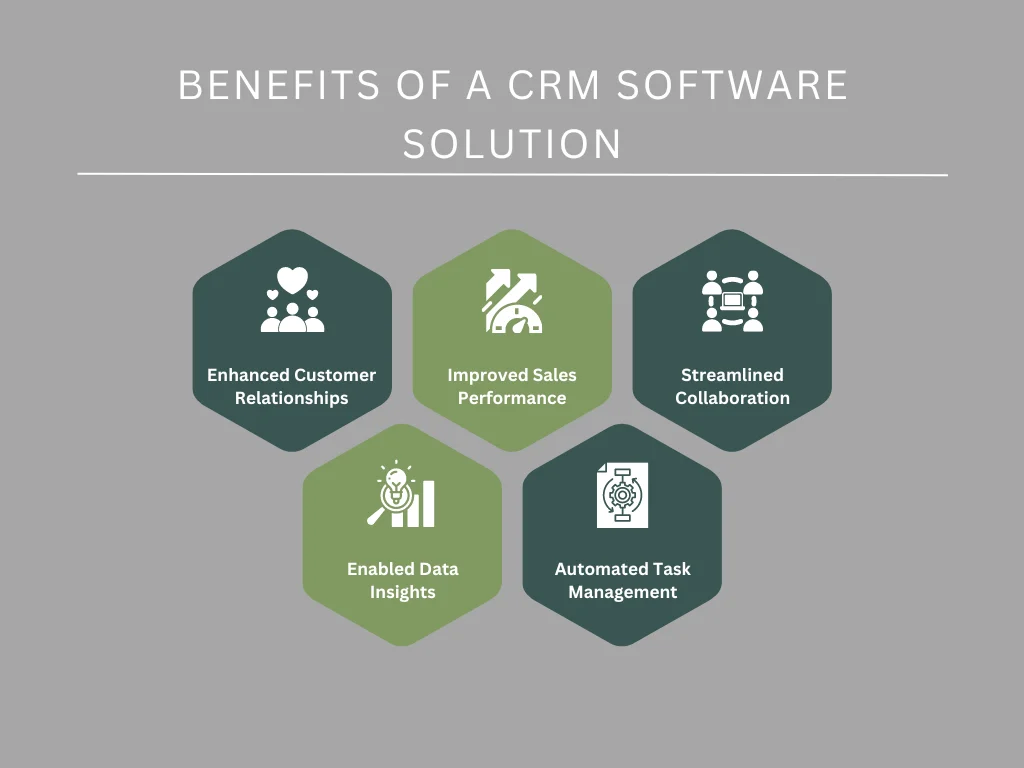
CRM differs from contact manager. Though similar in managing customer information, it offers businesses more advanced features and benefits. Below are the benefits of CRM systems, highlighting its comprehensive approach to managing customer relationships and optimizing business processes.
Enhanced Customer Relationships
CRM software creates a central database of comprehensive customer information, interactions, and preferences. This data enables businesses to better understand customer needs and provide personalized experiences, building trust and loyalty. The platform facilitates seamless communication and timely responses, improving customer satisfaction and retention rates.
Improved Sales Performance
Sales performance receives a significant boost from CRM software, which organizes customer data to help sales teams identify potential leads and tailor their offerings accordingly. With the ability to track customer preferences and purchase history, businesses can streamline sales processes and optimize their strategies for higher conversion rates.
Streamlined Collaboration
CRM promotes teamwork by allowing different departments to share information while working together on a common goal or objective. For example, sales teams can collaborate with marketing to create targeted campaigns based on customer data stored in the CRM.
It also enables accessible communication and task delegation, ensuring everyone is on the same page and working towards shared objectives. This streamlined collaboration leads to improved efficiency, better coordination, and, ultimately, enhanced customer satisfaction.
Enabled Data Insights
Unlike email contact managers, CRM software enables data insights by gathering and analyzing customer data. This provides valuable insights into customer experience and market trends. Businesses can then optimize their marketing strategies and identify growth opportunities. With real-time analytics and reporting features, CRM systems empower organizations to stay agile, adapt to market changes, and drive sustainable growth.
Automated Task Management
Task management becomes simpler with CRM software, which automates repetitive tasks like sending emails or scheduling appointments. Handling these tasks automatically, CRM frees up time for more important work. For instance, it can remind you to follow up with a customer or notify you when a task is due. This automation helps businesses stay organized, operate more efficiently, and provide better customer service.
Key Takeaway
Nowadays, many software tools specialize in managing customer information and enhancing communication workflows. An email contact manager is ideal for individuals or small teams seeking basic contact organization and email management. Alternatively, CRM software offers a more comprehensive solution for businesses with advanced functionalities like sales automation, marketing campaign management, and more.
Understanding the core differences between these tools enables businesses to make informed decisions based on their specific needs and goals. Whether focusing on individual productivity or holistic customer relationship management, the right tool ensures efficient communication and improved customer relationships.
Looking for remote workers in either email contact managers or CRM software? Book a free consultation with Pearl Talent today to discover the benefits of hiring skilled virtual assistants. Let Pearl Talent's expertise in overseas operations placement services support your success today.
Frequently Asked Questions
Originally Published
June 9, 2024




.svg)





.webp)












